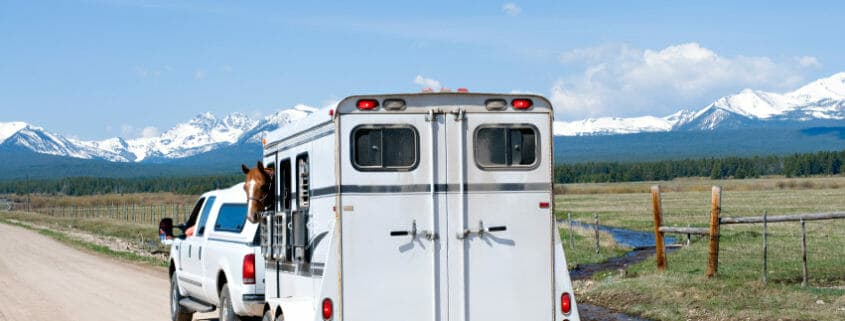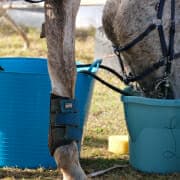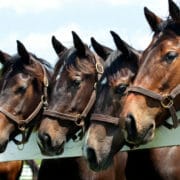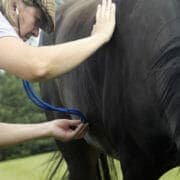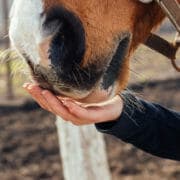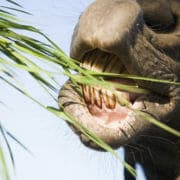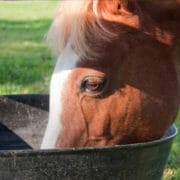Feeding on the Move
Takeaway anyone? How to feed your horse on the move
Horses in modern day society travel a lot. In fact it is amusing to think that throughout history, a horse’s most basic function was to transport humans from point A to B, and yet now we spend so much time and money transporting them. Transport for horses can be stressful, both physically and mentally. But as with all things, having a well prepared horse at the start of a journey means you have a far better chance of having a healthy horse at the end of the journey. Feeding and nutrition have a big role to play, both in preparing horses for a journey and keeping them healthy and content during the journey. The following article provides help with feeding before and during travel with horses.
Feeding before a journey
If you will be travelling less than 4 to 6 hours there is little need to do anything special before a trip aside from ensuring your horse is healthy and well fed prior to the trip and will have suitable feed and water available as soon as the journey has ended.
If you will be travelling more than 4 to 6 hours some special adjustments to the feeding routine can be made to assist horses during long-haul transport. These include:
- Increase the forage component of the ration – Forage is valuable to a travelling horse because it holds a large reservoir of water in the gut that can be used to keep the horse well hydrated during a long journey. Forages like hay and haylage are also a wonderful source of potassium and magnesium, two important electrolyte minerals. Feeding additional forage in the 2 to 3 days leading up to a long trip means your horse’s gut will be full of water holding, electrolyte rich fibre to help them get through long haul travel without becoming dehydrated. Additional forage also helps provide extra energy to reduce weight loss during a long trip.
- Moderate protein intake – Diets high in protein lead to an increased excretion of urea in the urine which is then converted by bacteria to ammonia. When confined in a transport situation, be it road or air transport, this ammonia accumulation in the air can damage the airways and lungs. To avoid large amounts of ammonia in the air, the amount of protein in the diet needs to be moderated. If your horse is on a diet with large amounts of lucerne hay or high protein pasture or feeds it is a good idea to reduce protein intake for 7 to 14 days before a long journey. Swapping some lucerne hay or high protein pasture for oaten or grassy hay and switching to a lower protein feed can help to achieve this. Use FeedXL to calculate your horse’s exact daily protein intake and reduce it where possible without compromising the quality of the diet.
- Reduce grain intake – High grain diets fed right up until a horse is transported can in some situations cause problems. They may lead to fractious behaviour and unnecessary stress during travel, they can precipitate tying up in susceptible horses and they also reduce gut fill and the amount of fibre a horse will consume. Reducing a horse’s grain intake by half for 2 to 3 days prior to travelling and increasing high energy fibre (see below) and forage intake will help to keep horses calm during travel, reduce the risk of tying up and maintain good gut fill and water storage in the gastrointestinal tract.
- Add high energy fibres to replace grain – some horses will lose weight if you reduce their grain intake. Many horses travelling long distances are also required to perform at a high level at the end of a journey, so maintaining energy intake is crucial. If you reduce grain intake, consider replacing the amount of grain removed from the diet with a high energy fibre. High energy fibres maintain energy intake, but also assist with water holding and maintaining gut fill.
- Work out your ‘water strategy’ – horses are notorious for not drinking at the most critical times, and during travel is no exception. Our equine friends often have no hesitation in turning their noses up at a bucket of water offered during travel, especially if it smells or tastes different to their water from home. Getting your horse to drink is critical during a long trip so you need to work out how you are going to achieve that. Taking your own water, using a flavour in the water so it tastes and smells the same regardless of where it comes from or using an electrolyte supplement to stimulate thirst are all possibilities. Whichever you choose, get your horse used to what and how it will be drinking at home prior to travel. If you will be taking your own water, start putting water in the bucket your horse will be drinking from while on the road and have it drink out of that for 4 or 5 days before you leave. If you are going to use a flavour, add it to your horse’s water for several days prior to the trip and again use the bucket you will use during travel. If you are going to use an electrolyte, talk to your vet or the product’s manufacturer about the best strategy in administering an electrolyte. Remember, never give an already dehydrated horse an electrolyte. And once you do administer an electrolyte, allow your horse free access to fresh water for at least 1 to 2 hours.
Feeding during the journey
If you are travelling more than 4 to 6 hours you should plan to stop every 3 to 4 hours to allow horses access to water and feed. Keep your horse’s feed routine on the road as close to what he would be fed at home as possible. So if you feed a hard feed morning and night with forage during the day, stick to this same routine.
Ideally horses should be allowed access to hay or haylage while travelling during these longer trips. If you are feeding hay, it should be thoroughly wet (submerse it in water for 5 to 10 minutes) before being put into the feed manger or hay bag for feeding to reduce dust and mould spore contamination of the air.
Where possible, hang the hay feeder low so the horse has to put its head down to reach the hay, but be sure to attach it to the transport vehicle in such a way that should the horse become entangled it will break free easily.
Any type of hay is suitable for feeding during long trips, though feeding a small amount of lucerne hay at each rest stop may help to provide better buffering of the stomach and reduce the risk of ulcers, which can be a problem for some horses travelling long distances.
If you are travelling over multiple days and your horse needs to perform at the end of the journey, you will need to continue with feeding at least some of its normal high energy ration. As discussed above, current recommendations suggest the amount of grain based feeds fed should be halved during travel days. If weight loss is an issue for your horse during travel you should add high energy fibre to its diet to replace the energy removed from the diet when the grain is reduced.
Other things that will help
There are many other management strategies you can put in place to help your horse stay healthy during long-haul travel, including:
- Monitor rectal temperature twice daily for 2 days prior to a long trip to establish your horse’s normal rectal temperature patterns and ensure your horse is healthy at the beginning of the trip.
- Monitor feed and water intake for 2 days prior to travelling to determine your horse’s normal feed and water intake amounts and patterns.
- Once your journey is complete, again monitor rectal temperatures and feed and water intake for any sign that your horse may be getting sick. The faster you recognise any symptoms and have your horse treated the less likely serious complications will arise.
- Stop every 4 to 6 hours for at least 15 to 30 minutes to allow your horse’s muscles to relax and have a break from constant movement. If possible, it is ideal to unload horses during these rest stops and allow them to put their head down and feed for 15 to 20 minutes to help clear their airways and reduce the risk of pleuropneumonia or travel sickness.
- Allow your horse a minimum of 6 to 8 hours of untied rest every 8 to 12 hours of travel and during this time feed your horse from feeders placed at ground level to keep their heads down and facilitate the clearing of inhaled debris and microorganisms from their respiratory system.
- Allow a minimum of 12 hours of untied rest with as much feeding at ground level as possible at the completion of the journey to allow your horse to completely clear its respiratory system before any sort of strenuous physical activity is undertaken. Working horses before they have a chance to clear their respiratory tract will increase the risk of pleuropneumonia.
- Be very careful not to overheat your horse during travel. It is our tendency to want to rug horses up and keep them cosy while travelling, but this can do far more harm than good if they get overheated. Overheating causes them to sweat, losing valuable water and electrolytes. It also makes travelling very uncomfortable. Remember that travelling does take quite a lot of physical effort for a horse so they can get very hot quite easily.
- Avoid the ‘head-up’ position during travel as much as possible. Avoid cross tying horses and where it is safe to do so, allow horses the ability to stretch their heads right down to ground level to allow them to clear their airways.
Happy travels!
Being well prepared with a healthy horse that is set up well to travel means you will have a very good chance of having a horse fit and ready to do what is required of it at the end of a journey. Subtle changes to the diet to increase forage and fibre intake, moderate protein intake and adjust grain or grain based feed intake all help to keep your horse content, healthy, well hydrated and at less risk of dehydration, impaction colic and injury or sickness during travel.
Taking adequate time to complete a journey, giving your horse regular rest stops and allowing it to feed in a head down position for good periods of time to clear its airways will also significantly reduce the risk of your horse developing pleuropneumonia. And of course, FeedXL will help you to make the required changes to a travelling horse’s diet without upsetting the diets balance which could cause you to unknowingly create other issues.
Do you have a question or comment? Do you need help with feeding?
We would love to welcome you to our FeedXL Horse Nutrition Facebook Group. Ask questions and have them answered by PhD and Masters qualified equine nutritionists and spend time with like-minded horse owners. It’s free!
Click here to join the FeedXL Horse Nutrition Facebook Group

